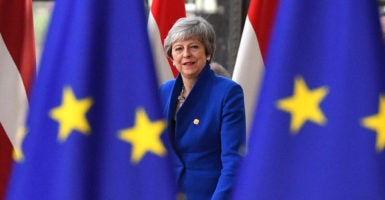The April 12 date for Great Britain to leave the European Union has now passed, and Great Britain is still paying about 1 billion pounds ($1.3 billion) a month to be a member of the EU.
Last Friday’s departure date was a delay to a previous March 29 deadline, and now it has been moved back yet again, this time to Oct. 31.
The departure date was supposedly set in order to give an ultimatum to the EU to make concessions on trade rules. Otherwise, the U.K. would be willing to leave without a deal and revert to World Trade Organization’s terms and tariffs.
“No deal is better than a bad deal,” Prime Minister Theresa May has said more than 100 times. So, why did she then flinch and delay exiting? Owen Paterson, a Conservative member of Parliament, says “the government was never going to countenance no-deal.”
So, what if the no-deal exit wasn’t intended to threaten the EU at all, but May’s own Parliament?
What if the deadline was really put there to force members of Parliament to vote for May’s withdrawal agreement, or otherwise be seen as responsible for Britain “falling off a ‘no-deal’ cliff edge and into the abyss?”
When May’s bluff was called, and the vote still failed, she pleaded some more with the EU to extend the date to give her colleagues more time to come around.
Sound plausible?
The prime minister and her long-serving finance minister, Philip Hammond, who voted to remain in the EU, have been working to modify the result of the June 23, 2016, Brexit referendum ever since she became prime minister about three weeks later, on July 13.
Alarm bells should have rung after her extraordinary July 2018 meeting at Chequers, the prime minister’s official country residence.
There, she cajoled Cabinet ministers into accepting an EU-friendly plan she had secretly drawn up with unelected civil servants. This so undermined the negotiating position of her Brexit minister, David Davis, that he resigned a few days later.
Although the Chequers plan as a whole was rejected by members of Parliament and in Brussels, the home of the European Union, some provisions of it made it into the withdrawal agreement she later signed with the EU.
British parliamentarians have since voted against that deal three times, but as the margin of defeat keeps narrowing—from 230 to 149 to 58—she aims to bring it back for a vote a fourth time, or more, if needed.
Not unlike the negotiating tactics of Andrei Gromyko, the former USSR’s onetime foreign minister, May’s strategy is based on stubbornness. But for the anti-Brexit “Remainers,” it has brought huge success.
Nearly three years on, Britain is still a member of the EU, and Parliament has taken “no deal” off the menu. The only choices left for members of Parliament now are to vote for her agreement or abandon Brexit altogether.
The deal has been criticized for potentially separating Northern Ireland from the United Kingdom and keeping Britain subject to ongoing EU controls without any representation—a “vassal state,” as leading Brexit proponent Jacob Rees-Mogg has described it.
May’s latest overtures to the Labour Party to help get her deal through could also lead to Britain staying in the EU Customs Union and unable to make its own trade deals.
That’s dismissed by Hammond, who recently gloated, “In a year’s time, when this is behind us, and people are focused on other things, all this will be forgotten.”
Pro-Brexit forces aren’t taking all this sitting down, however.
A group called the English Democrats has brought a case to the High Court, asserting that Britain has already left the EU, as there was no basis in UK law for changing the original March 29 default exit date.
There are also renewed calls to remove May as prime minister from many leading Conservatives, such as Sir William Cash.
How to do that in the short term without potentially removing many of themselves in the process in a general election is not immediately clear. That’s because not only has May made Brexit immeasurably more difficult, she has made the Conservative Party toxic as well.
May also has to face a resurgent Nigel Farage with his new Brexit party, which aims to become the EU’s worst nightmare and wants to challenge the British two-party system.
Farage hopes to do well in the May 23-26 EU parliamentary elections, which Britain will now have to take part in at a cost of more than 100 million pounds ($130 million).
Farage further hopes his fledgling party will become a major force in British politics by appealing to some 17.4 million largely disillusioned pro-Brexit voters.
Stay tuned for the next installment in this convoluted Brexit saga.































